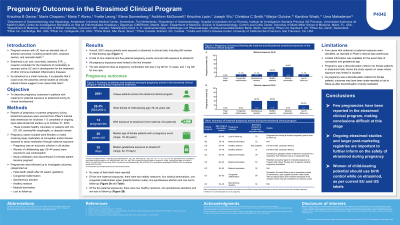Tuesday Poster Session
Category: IBD
P4342 - Pregnancy Outcomes in the Etrasimod Clinical Program
Tuesday, October 29, 2024
10:30 AM - 4:00 PM ET
Location: Exhibit Hall E


Yvette Leung, MD
University of British Columbia
Vancouver, BC, Canada
Presenting Author(s)
Krisztina B. Gecse, MD, PhD1, Maria Chaparro, MD, PhD2, Maria T. Abreu, MD3, Yvette Leung, MD4, Elena Sonnenberg, MD5, Aoibhinn McDonnell, PhD6, Krisztina Lazin, MD7, Joseph Wu, PhD8, Christina C. Smith, PharmD, MBA9, Márjori Dulcine, MD, MSc10, Karolina Wosik, MSc, PhD11, Uma Mahadevan, MD12
1Amsterdam University Medical Center, Amsterdam, Noord-Holland, Netherlands; 2Hospital Universitario de La Princesa, Instituto de Investigación Sanitaria Princesa (IIS Princesa), Universidad Autónoma de Madrid (UAM), Centro de Investigacíon Biomédica en Red de Enfermedades Hepáticas y Digestivas (CIBERehd), Diego de León, Madrid, Spain; 3Crohn's and Colitis Center, University of Miami Miller School of Medicine, Miami, FL; 4University of British Columbia, Vancouver, BC, Canada; 5Medizinische Klinik m. S. Gastroenterologie, Infektiologie und Rheumatologie, Charité-Universitätsmedizin Berlin, Berlin, Berlin, Germany; 6Pfizer Ltd., Sandwich, England, United Kingdom; 7Pfizer AG, Zürich, Zurich, Switzerland; 8Pfizer Inc., Cambridge, MA; 9Pfizer Inc., Collegeville, PA; 10Pfizer Brazil, São Paulo, Sao Paulo, Brazil; 11Pfizer Canada, Kirkland, PQ, Canada; 12Colitis and Crohn’s Disease Center, University of California San Francisco, San Francisco, CA
Introduction: Etrasimod is an oral, once-daily, selective sphingosine 1-phosphate (S1P)1,4,5 receptor modulator for the treatment of moderately to severely active ulcerative colitis (UC) and in development for the treatment of other immune-mediated inflammatory diseases. Based on animal studies at clinically relevant doses, etrasimod may cross the placenta and cause fetal harm. This analysis describes pregnancy outcomes in patients with maternal or paternal exposure to etrasimod during its clinical development.
Methods: Reports of pregnancy or partner pregnancy during etrasimod exposure were identified from all phase 1–3 completed or ongoing open-label studies up to October 31, 2023. These studies included healthy volunteers or patients with UC, Crohn’s disease, atopic dermatitis, eosinophilic esophagitis, or alopecia areata. In all studies, pregnancy was an exclusion criterion, women of childbearing age were required to use contraception and study drug was discontinued in any female patient that became pregnant. Pregnancy outcomes were categorized as healthy newborn, medical termination, fetal death, congenital malformation, spontaneous abortion, or lost to follow-up.
Results: In total, 2,091 unique patients were exposed to etrasimod in clinical trials; 593 (28.4%) were females of childbearing age (aged 16–44). There was a total of 14 pregnancies with exposure to etrasimod (nine maternal, five paternal). All pregnancy exposures were limited to the first trimester. Median (range) age of women with maternal etrasimod exposure was 28.0 (18–36) years. Estimated length of maternal etrasimod exposure (from last menstrual period until last etrasimod dose) ranged from 22 to 79 days. Of the nine maternal exposures, pregnancy outcomes were two healthy newborns, four medical terminations (two for unknown reasons, one due to an anembryonic gestation, and one following “signs of a missed pregnancy”), and one each resulting in a congenital malformation (open [patent] foramen ovale) spontaneous abortion and loss to follow-up (Table). Of the five paternal exposures, there were two healthy newborns, two spontaneous abortions, and one lost to follow-up (Table).
Discussion: Few pregnancies have been reported in the etrasimod clinical program, with no clear trends on the risk of maternal or paternal etrasimod exposure. Ongoing etrasimod studies and larger post-marketing registries will further inform on the safety of etrasimod during pregnancy. Women of child-bearing potential should use birth control while on etrasimod.
Note: The table for this abstract can be viewed in the ePoster Gallery section of the ACG 2024 ePoster Site or in The American Journal of Gastroenterology's abstract supplement issue, both of which will be available starting October 27, 2024.
Disclosures:
Krisztina B. Gecse, MD, PhD1, Maria Chaparro, MD, PhD2, Maria T. Abreu, MD3, Yvette Leung, MD4, Elena Sonnenberg, MD5, Aoibhinn McDonnell, PhD6, Krisztina Lazin, MD7, Joseph Wu, PhD8, Christina C. Smith, PharmD, MBA9, Márjori Dulcine, MD, MSc10, Karolina Wosik, MSc, PhD11, Uma Mahadevan, MD12. P4342 - Pregnancy Outcomes in the Etrasimod Clinical Program, ACG 2024 Annual Scientific Meeting Abstracts. Philadelphia, PA: American College of Gastroenterology.
1Amsterdam University Medical Center, Amsterdam, Noord-Holland, Netherlands; 2Hospital Universitario de La Princesa, Instituto de Investigación Sanitaria Princesa (IIS Princesa), Universidad Autónoma de Madrid (UAM), Centro de Investigacíon Biomédica en Red de Enfermedades Hepáticas y Digestivas (CIBERehd), Diego de León, Madrid, Spain; 3Crohn's and Colitis Center, University of Miami Miller School of Medicine, Miami, FL; 4University of British Columbia, Vancouver, BC, Canada; 5Medizinische Klinik m. S. Gastroenterologie, Infektiologie und Rheumatologie, Charité-Universitätsmedizin Berlin, Berlin, Berlin, Germany; 6Pfizer Ltd., Sandwich, England, United Kingdom; 7Pfizer AG, Zürich, Zurich, Switzerland; 8Pfizer Inc., Cambridge, MA; 9Pfizer Inc., Collegeville, PA; 10Pfizer Brazil, São Paulo, Sao Paulo, Brazil; 11Pfizer Canada, Kirkland, PQ, Canada; 12Colitis and Crohn’s Disease Center, University of California San Francisco, San Francisco, CA
Introduction: Etrasimod is an oral, once-daily, selective sphingosine 1-phosphate (S1P)1,4,5 receptor modulator for the treatment of moderately to severely active ulcerative colitis (UC) and in development for the treatment of other immune-mediated inflammatory diseases. Based on animal studies at clinically relevant doses, etrasimod may cross the placenta and cause fetal harm. This analysis describes pregnancy outcomes in patients with maternal or paternal exposure to etrasimod during its clinical development.
Methods: Reports of pregnancy or partner pregnancy during etrasimod exposure were identified from all phase 1–3 completed or ongoing open-label studies up to October 31, 2023. These studies included healthy volunteers or patients with UC, Crohn’s disease, atopic dermatitis, eosinophilic esophagitis, or alopecia areata. In all studies, pregnancy was an exclusion criterion, women of childbearing age were required to use contraception and study drug was discontinued in any female patient that became pregnant. Pregnancy outcomes were categorized as healthy newborn, medical termination, fetal death, congenital malformation, spontaneous abortion, or lost to follow-up.
Results: In total, 2,091 unique patients were exposed to etrasimod in clinical trials; 593 (28.4%) were females of childbearing age (aged 16–44). There was a total of 14 pregnancies with exposure to etrasimod (nine maternal, five paternal). All pregnancy exposures were limited to the first trimester. Median (range) age of women with maternal etrasimod exposure was 28.0 (18–36) years. Estimated length of maternal etrasimod exposure (from last menstrual period until last etrasimod dose) ranged from 22 to 79 days. Of the nine maternal exposures, pregnancy outcomes were two healthy newborns, four medical terminations (two for unknown reasons, one due to an anembryonic gestation, and one following “signs of a missed pregnancy”), and one each resulting in a congenital malformation (open [patent] foramen ovale) spontaneous abortion and loss to follow-up (Table). Of the five paternal exposures, there were two healthy newborns, two spontaneous abortions, and one lost to follow-up (Table).
Discussion: Few pregnancies have been reported in the etrasimod clinical program, with no clear trends on the risk of maternal or paternal etrasimod exposure. Ongoing etrasimod studies and larger post-marketing registries will further inform on the safety of etrasimod during pregnancy. Women of child-bearing potential should use birth control while on etrasimod.
Note: The table for this abstract can be viewed in the ePoster Gallery section of the ACG 2024 ePoster Site or in The American Journal of Gastroenterology's abstract supplement issue, both of which will be available starting October 27, 2024.
Disclosures:
Krisztina Gecse: AbbVie – Consultant, Speakers Bureau. Celltrion – Consultant, Grant/Research Support, Speakers Bureau. Ferring Pharmaceuticals – Consultant, Speakers Bureau. Galapagos – Grant/Research Support. Immunic Therapeutics – Consultant, Speakers Bureau. Janssen – Consultant, Speakers Bureau. Novartis – Consultant, Speakers Bureau. Pfizer Inc – Consultant, Grant/Research Support, Speakers Bureau. Samsung Bioepis – Consultant, Speakers Bureau. Takeda – Consultant, Speakers Bureau. Tillots – Consultant, Speakers Bureau.
Maria Chaparro: AbbVie – Consultant, Grant/Research Support, Speakers Bureau. Biogen – Consultant, Grant/Research Support, Speakers Bureau. Dr Falk Pharma – Consultant, Grant/Research Support, Speakers Bureau. Eli Lilly and Company – Consultant, Grant/Research Support, Speakers Bureau. Ferring – Consultant, Grant/Research Support, Speakers Bureau. Gilead – Consultant, Grant/Research Support, Speakers Bureau. Hospira – Consultant, Grant/Research Support, Speakers Bureau. Janssen – Consultant, Grant/Research Support, Speakers Bureau. MSD – Consultant, Grant/Research Support, Speakers Bureau. Pfizer – Consultant, Grant/Research Support, Speakers Bureau. Shire Pharmaceuticals – Consultant, Grant/Research Support, Speakers Bureau. Takeda – Consultant, Grant/Research Support, Speakers Bureau. Tillotts Pharma – Consultant, Grant/Research Support, Speakers Bureau.
Maria Abreu: AbbVie – Advisory Committee/Board Member, Consultant. Alimentiv – Lecturing Fee. Arena Pharmaceuticals Inc. – Advisory Committee/Board Member, Consultant. Bristol Myers Squibb – Advisory Committee/Board Member, Consultant. Celsius Therapeutics – Advisory Committee/Board Member, Consultant. Gilead – Advisory Committee/Board Member, Consultant. Janssen – Advisory Committee/Board Member, Consultant, Lecturing Fee. Lilly – Advisory Committee/Board Member, Consultant. Pfizer – Advisory Committee/Board Member, Consultant. Prime – Lecturing Fee. Prometheus Biosciences – Advisory Committee/Board Member, Consultant. UCB – Advisory Committee/Board Member, Consultant. WedMD Global LLC – Lecturing Fee.
Yvette Leung: AbbVie – Advisory Committee/Board Member, Consultant. Celltrion – Advisory Committee/Board Member. Eli Lilly – Advisory Committee/Board Member, Consultant. Janssen – Advisory Committee/Board Member, Consultant. Pfizer Inc – Advisory Committee/Board Member, Consultant. Sandoz – Advisory Committee/Board Member. Takeda – Advisory Committee/Board Member, Consultant.
Elena Sonnenberg: AbbVie – Consultant, Speakers Bureau. Biogen – Speakers Bureau. Bristol-Myers Squibb – Speakers Bureau. CED Service GmbH – Speakers Bureau. Celltrion – Speakers Bureau. Dr. Falk Pharma – Speakers Bureau. Janssen – Consultant, Speakers Bureau. Takeda – Speakers Bureau.
Aoibhinn McDonnell: Pfizer Inc – Stock Options. Pfizer Ltd – Employee.
Krisztina Lazin: Pfizer AG – Employee. Pfizer Inc – Stock Options.
Joseph Wu: Pfizer Inc – Employee, Stock Options.
Christina Smith: Pfizer Inc – Employee, Stock Options.
Márjori Dulcine: Pfizer Inc – Employee, Stock Options.
Karolina Wosik: Pfizer Canada Inc – Employee, Stock Options.
Uma Mahadevan: AbbVie – Consultant. Boeringher Ingelheim – Consultant. Bristol-Myers Squibb – Consultant. Celltrion – Consultant. Enveda – Consultant. Gilead – Consultant. Janssen – Consultant. Leona and Harry Helmsley Trust – Grant/Research Support. Lilly – Consultant. Merck (DSMB) – Advisory Committee/Board Member. Pfizer Inc – Consultant. Protagonist – Consultant. Rama Therapeutics – Advisory Committee/Board Member. Roivant – Consultant. Takeda – Consultant.
Krisztina B. Gecse, MD, PhD1, Maria Chaparro, MD, PhD2, Maria T. Abreu, MD3, Yvette Leung, MD4, Elena Sonnenberg, MD5, Aoibhinn McDonnell, PhD6, Krisztina Lazin, MD7, Joseph Wu, PhD8, Christina C. Smith, PharmD, MBA9, Márjori Dulcine, MD, MSc10, Karolina Wosik, MSc, PhD11, Uma Mahadevan, MD12. P4342 - Pregnancy Outcomes in the Etrasimod Clinical Program, ACG 2024 Annual Scientific Meeting Abstracts. Philadelphia, PA: American College of Gastroenterology.
